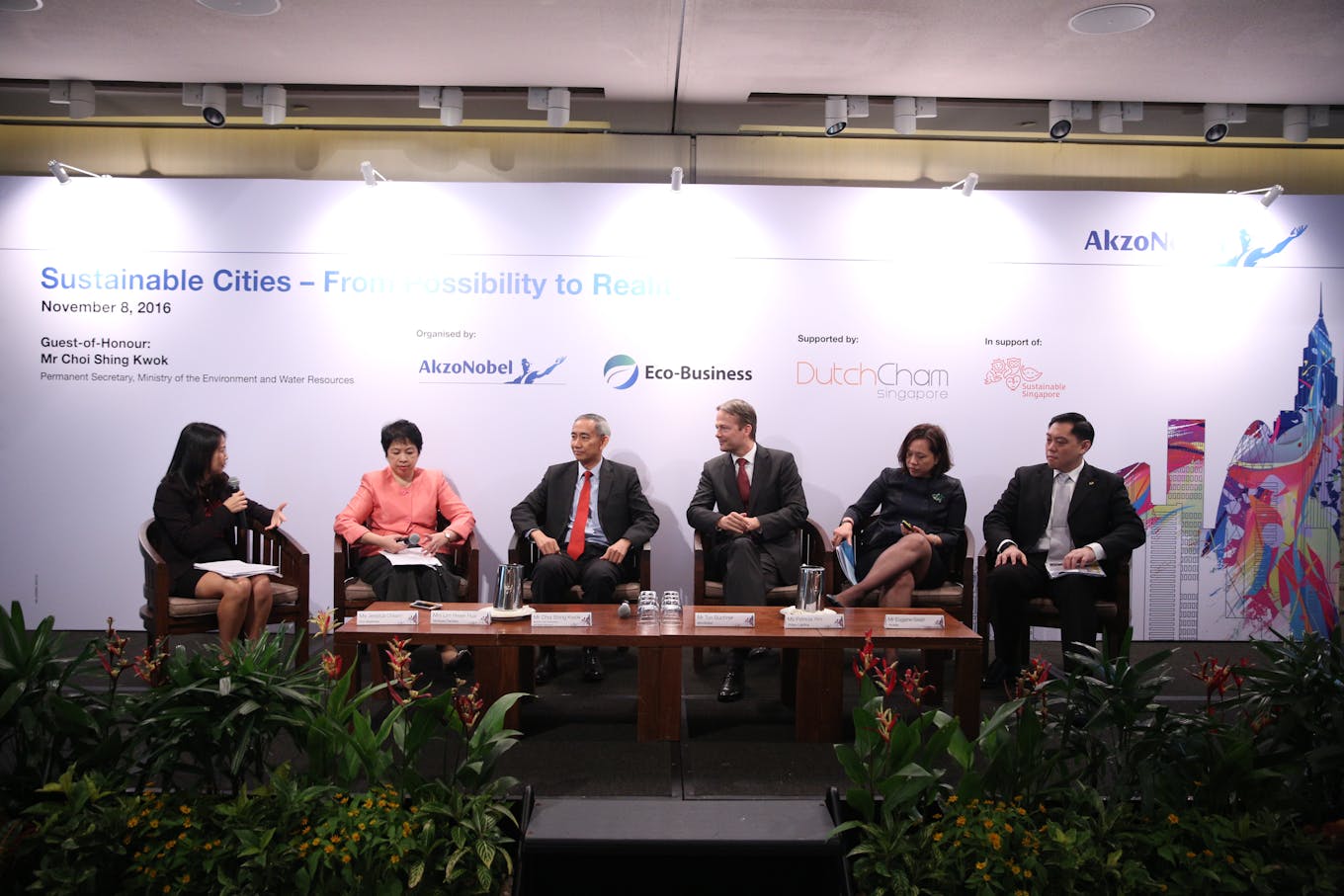As part of a global effort to create more liveable cities, the United Nations’ Sustainable Development Goals (SDGs) should be part of the curriculum in every primary and secondary school in the world, said AkzoNobel chief executive Ton Büchner at the Cities:Possibilities forum last week.
To continue watching, subscribe to Eco‑Business.
There's something for everyone. We offer a range of subscription plans.
- Access our stories and receive our Insights Weekly newsletter with the free EB Member plan.
- Unlock unlimited access to our content and archive with EB Circle.
- Publish your content with EB Premium.
“The SDGs are a strategy to make the world a more sustainable, liveable place but nobody knows anything about them. If nobody knows about them, we don’t get anything done.”
The SDGs were developed by the UN to replace the Millennium Development Goals and adopted last year. They outline 17 key targets covering environmental protection, eliminating poverty, and ensuring good living standards for all.
The inaugural forum, which was co-hosted by Eco-Business and AkzoNobel, a Dutch manufacturing corporation that makes healthcare products, coatings and chemicals, convened 250 senior business and government leaders to discuss urban solutions that can be scaled to achieve significant sustainability impact.
During the forum, participants heard that balancing urbanisation and ecological sustainability is the greatest challenge of the 21st century, given that the UN expects up to 75 per cent of the global population to be living in cities by the year 2050.
Even as municipal governments seek solutions to urban problems such as resource scarcity and pollution, climate change continues to pose a threat to the global environment. Cities have also been called the battleground of climate change, where there is the most potential to act against it before time runs out.
Panellists at the forum, held at Grand Hyatt Singapore, agreed that it was not enough to have sustainable practices in the government or private businesses if there is no buy-in or behaviour change from the rest of industry and the people at large.
“
Once people buy into government policy (of sustainability), they run it themselves, they own it. That’s where sustainable cities become possible.
Eugene Seah, country head and city executive director, Arcadis
Singapore’s permanent secretary in the Ministry of the Environment Water Resources, Choi Shing Kwok, illustrated this by sharing the government’s plans for a more eco-friendly, carbon-light nation through the Sustainable Singapore Blueprint (SSB).
He said that while there have been signs of progress on many fronts of the SSB, perhaps the “most intangible but still remarkably important is behavioral change on the part of the people”.
While aspects of sustainability such as waste management are under the direct control of the government, it cannot dictate what goes on in the home and whether Singaporeans are sorting and recycling waste correctly.
“That will take a stronger educational approach and requires a change in the heart of every Singaporean,” said Choi.
Lim Hwee Hua, executive director of private equity investment firm Tembusu Partners, and former Second Minister for Finance and Transport for Singapore, added that becoming sustainable has a lot to do with education and “letting people understand that (doing) a little bit will add to the larger picture”.
Lim added that education could start with letting Singaporeans know that sustainability is not just the government’s business but “everyone’s business”.

Discussing the possibilities for a future of sustainable cities. From left: Eco-Business founder and editor, Jessica Cheam; executive director of private equity investment firm Tembusu Partners, Lim Hwee Hua; permanent secretary in the Ministry of the Environment Water Resources, Choi Shing Kwok; AkzoNobel chief executive, Ton Büchner; market leader ASEAN Pacific at Philips Lighting, Patricia Yim; and country head and city executive director for Arcadis, Eugene Seah. Image: AkzoNobel
The business of sustainability
Panellist Patricia Yim, general manager at Philips Lighting, said such a situation called for “evangelism” on the part of sustainability practitioners. “People want to do something, but they don’t know where to start,” she said.
Within the business community, companies like Philips Lighting can share “what we’ve learned and done, and how others can start on a journey that makes perfect sense”.
Philips Lighting produces LED lightbulbs, which together with its intelligent, connective solutions, can reduce energy consumption of lighting by up to 80 per cent, according to Yim.
The company has pledged to power 100 per cent of its operations with renewable energy by 2020, and derive 80 per cent of its business from sustainable products, systems, and services.
Echoing Yim’s point on sharing experiences, AkzoNobel’s Büchner said companies that start on sustainability now do not need to take “50 years to figure it out anymore”, as they can simply learn from those who have done it.
AkzoNobel has committed to slashing its carbon emissions by between 25 to 30 per cent by 2020, from a 2012 baseline, and increase revenue from eco-friendly products by 20 per cent within the same time frame. One such “eco-premium product” is its Intersleek marine coatings to help ships cut down on fuel consumption and emissions, Büchner explained.
Panellist Eugene Seah, country head and city executive director, Arcadis, highlighted that communication and success stories remain important for buy-in from the public. His company’s Sustainable Cities Index was clear on one thing - “Once people buy into government policy (of sustainability), they run it themselves, they own it. That’s where sustainable cities become possible.”
The Dutch Ambassador to Singapore, Jacques Werner, closed the forum by encouraging Singapore to share its story. “Singapore, don’t forget…you have an extremely good story to share,” he said. “You have this x factor, so please make sensible use of it. You can do more than you even think.”

















